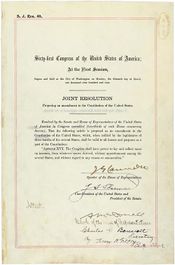Twentieth Amendment
 From Conservapedia
From Conservapedia Section 1. The terms of the President and Vice President shall end at noon on the 20th day of January, and the terms of Senators and Representatives at noon on the 3d day of January, of the years in which such terms would have ended if this article had not been ratified; and the terms of their successors shall then begin.
Section 2. The Congress shall assemble at least once in every year, and such meeting shall begin at noon on the 3d day of January, unless they shall by law appoint a different day.
Section 3. If, at the time fixed for the beginning of the term of the President, the President elect shall have died, the Vice President elect shall become President. If a President shall not have been chosen before the time fixed for the beginning of his term, or if the President elect shall have failed to qualify, then the Vice President elect shall act as President until a President shall have qualified; and the Congress may by law provide for the case wherein neither a President elect nor a Vice President elect shall have qualified, declaring who shall then act as President, or the manner in which one who is to act shall be selected, and such person shall act accordingly until a President or Vice President shall have qualified.
Section 4. The Congress may by law provide for the case of the death of any of the persons from whom the House of Representatives may choose a President whenever the right of choice shall have devolved upon them, and for the case of the death of any of the persons from whom the Senate may choose a Vice President whenever the right of choice shall have devolved upon them.
Section 5. Sections 1 and 2 shall take effect on the 15th day of October following the ratification of this article.
Section 6. This article shall be inoperative unless it shall have been ratified as an amendment to the Constitution by the legislatures of three-fourths of the several States within seven years from the date of its submission.
Under the 20th amendment, ratified in 1933, regular sessions of Congress begin on January 3 of each year, unless Congress passes a law in the previous session changing the date. Also, the terms of members begin and end on January 3 of odd-numbered years. Under these arrangements, any meeting of Congress between the November midterm elections in an even-numbered year and ending the following January 3 in an odd-numbered year is considered a lame duck session.
The 20th amendment was popularly known at the time of its ratification as the 1933 "Norris Lame Duck" Amendment, because it served to eliminate the December to March Congressional "lame duck" sessions that resulted from constitutionally and legislatively established dates for the beginning (December) and close (March in odd numbered years) of congressional sessions. Prior to the 1933, before railroads shortened travel time, the three-month long lame duck sessions (December to March) reflected the amount of time it took for members of Congress to journey to Washington DC.
This Amendment served a timing purpose, which was to end lame duck sessions, but today has little substantive significance. With unforeseen advancements in technology (i.e. airplanes), time spent travelling to Washington D.C. dramatically decreased, which enabled Congress to commence lame duck sessions; even though the country ratified a constitutional amendment intended to kill off sessions like this, where defeated legislators return to legislate, lame duck session still occur today.
Section 1 advanced the swearing in of the president and vice president from March 4 to January 20, and the induction of congressmen from March 4 to January 3. It also modified the Twelfth Amendment in its reference to March 4 as the deadline for the House selecting the president, if necessary.
Section 2 supersedes Art. I, Sec. 4, clause 2.
Pursuant to Section 3 of this amendment, Congress enacted the Presidential Succession Act of 1948 to address the situation if both the president-elect and vice president-elect fail to qualify on or before the time fixed for the beginning of the new term.
Amendments to the Constitution of the United States of America Bill of Rights:
1 - Freedom of speech, press, religion, etc.
2 - Right to bear arms
3 - Quartering of soldiers
4 - Warrants
5 - Due process
6 - Right to a speedy trial
7 - Right by trial of a jury
8 - No cruel or unusual punishments
9 - Unenumerated rights
10 - Power to the people and states
11 - Immunity of states to foreign suits
12 - Revision of presidential election procedures
13 - Abolition of slavery
14 - Citizenship
15 - Racial suffrage
16 - Federal income tax
17 - Direct election of the United States Senate
18 - Prohibition of alcohol
19 - Women's suffrage
20 - Terms of the presidency
21 - Repeal of Eighteenth Amendment
22 - Limits the president to two terms
23 - District of Columbia Voting for President
24 - Prohibition of poll taxes
25 - Presidential disabilities
26 - Voting age lowered to 18
27 - Variance of congressional compensation
Categories: [United States Constitution]
↧ Download as ZWI file | Last modified: 02/20/2023 01:45:29 | 24 views
☰ Source: https://www.conservapedia.com/Twentieth_Amendment | License: CC BY-SA 3.0
 ZWI signed:
ZWI signed:
 KSF
KSF